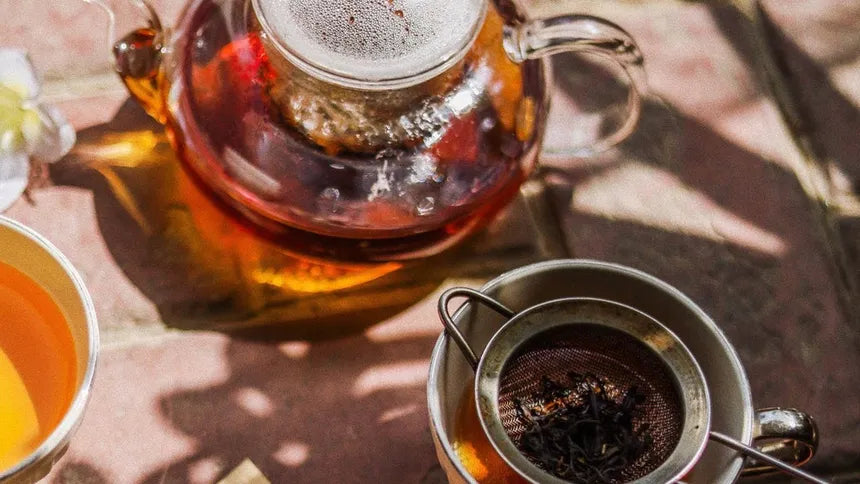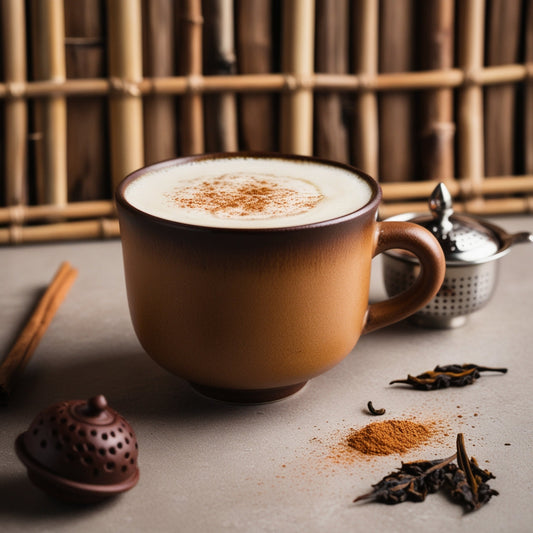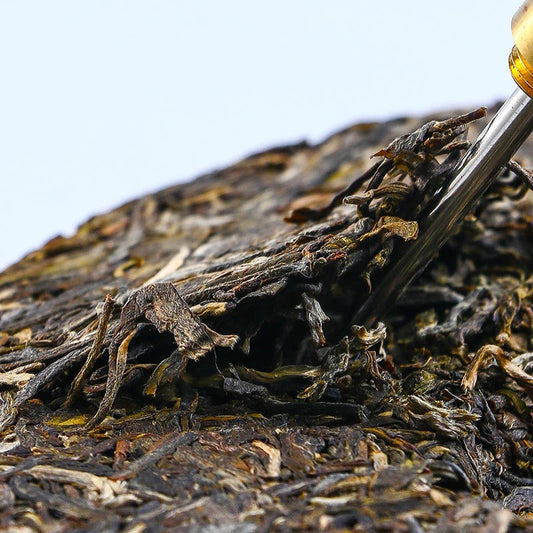Overview
Why does so many people prefer Black tea over other teas?
Black tea is known worldwide and is loved for its rich taste. It has a rich history around it. Moreover there is a confusion in choosing black tea or coffee. After reading this article you will know why its better to choose black tea. This article will walk you through the rich history, origins, benefits, side effects, types of black tea and how to brew one.
Table of Content
- Introduction
- Where Does Black Tea Come From?
- Benefits of Black Tea
- Side effects of Black tea
- Types of Black Tea
- How to brew Black Tea?
- Conclusion
Introduction
Black tea has a long rich history, it is one of the most consumed teas globally. The deep flavour and numerous health benefits make it a popular choice for many people. However, there are some people who still has not discovered Black tea. Moreover, it can be enjoyed with milk or on its own. Understanding this teas origins and production methods can enhance and appreciate this tea more.
Where does Black Tea Come From?
Black tea comes from the Camellia sinensis plant, the same plant used to make oolong and green teas.The key difference lies in the processing black tea leaves undergo full oxidation, giving them their dark colour and bold flavour. Originating in China, black tea first developed during the Ming dynasty in the 17th century and is known as hong cha, or 'red tea.' As it began to export to Western countries, it gained popularity, particularly in Britain.
India is also one of the largest producers of this tea. The British introduced tea cultivation in 19th century, focusing on regions like Assam and darjeeling. Sri Lanka is also an major player in producing this tea. The island’s diverse climate gives it a unique taste profile. Black tea is also cultivated in other parts of the world, like Kenya, Nepal and Taiwan. Each region produces different flavour and characteristics which is influenced by the soil and climate.

Benefits of Black tea
People also enjoy this tea for its many health benefits.
1. Packed with Antioxidants
This tea is rich in antioxidants like polyphenols and flavanoids. These antioxidants can help the body to protect against oxidative stress, which potentially reduces the risk of chronic diseases.
2. Improves Heart Health
Studies have shown that this tea can support heart health. The flavonoids in this tea may help lower blood pressure, reduce cholesterol levels, and improve overall cardiovascular function. Regular consumption of this tea is linked to a lower risk of heart disease.
3. Boosts Mental Alertness
The moderate caffeine content in this tea can enhance mental alertness and concentration. It also contains L-theanine, which promotes relaxation without drowsiness. This unique combination makes this tea an excellent choice for improving focus during work or study sessions. Some studies have even suggested that the caffeine can improve memory retention and cognitive performance.
4. Supports Stomach Health
The polyphenols can promote a healthy gut by helping the growth of beneficial bacteria. A healthy gut microbiome is essential for digestion and immune function. Drinking this tea may also help alleviate digestive issues, making it a soothing choice after meals.
5. May Aid Weight Management
Drinking this tea can aid in weight management by boosting metabolism and promoting fat oxidation. Its low calorie count also makes it a healthier alternative to sugary beverages. Adding it into a balanced diet may support weight loss efforts when combined with a healthy lifestyle.
Side Effects of Black Tea
While it has many benefits, there are some potential side effects to consider, especially when consumed in excess:
1. Caffeine Sensitivity
Some people may be sensitive to caffeine and experience side effects such as jitters, increased heart rate, or difficulty sleeping. It’s recommended for those sensitive to caffeine to monitor their intake and choose decaffeinated options if necessary. For most people, moderate consumption of black tea is safe and can even be beneficial.
2. Iron Absorption
Tannins can inhibit the absorption of non-heme iron, particularly from plant-based foods. This could be a problem for individuals with iron deficiency or those following a vegetarian diet. Drinking black tea between meals rather than with meals may help mitigate this effect. If you’re concerned about iron levels, consider limiting black tea consumption during meals.
3. Staining of Teeth
The tannins present in this tea can lead to staining of the teeth over time. Regular dental hygiene practices, such as brushing and rinsing after drinking tea, can help to prevent staining and maintain oral health.
Types of Black Tea
It comes in various types, each with its own unique flavour and characteristics:
1. Assam
Assam tea, cultivated in India, boasts a bold, malty flavour and a rich colour. Its strong taste makes it a favourite for breakfast blends, pairing perfectly with milk and sugar. Many people choose Assam tea for a refreshing start to their day. Its robust flavour complements hearty breakfasts and makes it enjoyable at any time.
2. Darjeeling
Commonly referred to as the "Champagne of Teas," Darjeeling tea is grown in the foothills of the Himalayas. Additionally, it has a lighter, more floral taste, making it ideal for sipping without milk. Darjeeling is harvested in several flushes throughout the year, each offering a distinct flavour profile. The first flush, harvested in spring, tends to have a delicate and fruity taste, while the second flush, in summer, is bolder and more aromatic.
3. Ceylon
Ceylon tea, sourced from Sri Lanka, offers a bright and citrusy profile. You can enjoy it plain or with milk and sugar, making it a versatile choice. The various growing regions in Sri Lanka produce a range of flavour notes, from fruity to spicy, which enhance the complexity of Ceylon tea. Known for its high quality, Ceylon tea has become a popular option in tea blends around the world.
4. Keemun
Keemun tea, from China, offers a slightly smoky flavour with sweet undertones. Moreover, it’s a key component in some English tea blends and is highly regarded for its smooth finish. Keemun is often enjoyed on its own or with a touch of milk. Additionally, It's unique flavour makes it a favourite for those who appreciate more rich tea experiences.
5. Earl Grey
Earl Grey is a popular blend that combines black tea with bergamot oil, providing a distinctive citrus aroma. Additionally, this tea is perfect for afternoon tea and can be enjoyed with or without milk. Its unique flavour has made it a favourite among tea lovers. The special bergamot notes improve the black tea base, making it a refreshing and fragrant experience.
How to Brew Black Tea?
Brewing black tea is simple, but a few tips can enhance your experience:
- Choose Quality Tea: Start with high-quality loose leaf or tea bags. Fresh, loose-leaf tea often provides a more robust flavour compared to pre-packaged tea bags.
- Water Temperature: Boil water to about 90-95°C (194-203°F). Black tea requires hot water to fully extract its flavours and beneficial compounds.
- Steeping Time: Steep the tea for 3-5 minutes, depending on the type of black tea and your personal taste preference. Longer steeping times can result in a stronger, more astringent flavour.
- Ratio of Tea to Water: Use about 1 teaspoon of loose tea per cup (240 ml) of water. Adjust according to your taste; more tea will result in a stronger brew.
- Personalisation: Feel free to add milk, sugar, or lemon to taste. Many people enjoy their black tea with a splash of milk or a slice of lemon, which can enhance the flavours.
- Strain and Serve: If using loose leaf tea, strain it before serving. For tea bags, simply remove the bag after steeping.
Conclusion
Black tea, with its rich history and numerous health benefits, continues to be a favourite beverage worldwide. Its journey from China, India, and Sri Lanka to your cup involves careful cultivation and processing. Whether you prefer the boldness of Assam, the delicacy of Darjeeling, or the brightness of Ceylon, there’s a black tea to suit everyone.Understanding the origins and benefits of black tea can enhance your appreciation for this drink. We have explored so much about black tea if you want to try out new teas then Pu-erh Tea is a great option to try out.
Q&A Section
Q1: What is black tea?
A1: Black tea is a type of tea made from fully oxidised tea leaves, which gives it a strong flavour and dark colour.
Q2: What are the health benefits of black tea?
A2: Black tea is rich in antioxidants, can improve heart health, boosts mental alertness, and may support digestion.
Q3: How should I brew black tea?
A3: To brew black tea, use boiling water, steep the leaves for 3-5 minutes, and enjoy it plain or with milk and sugar.







